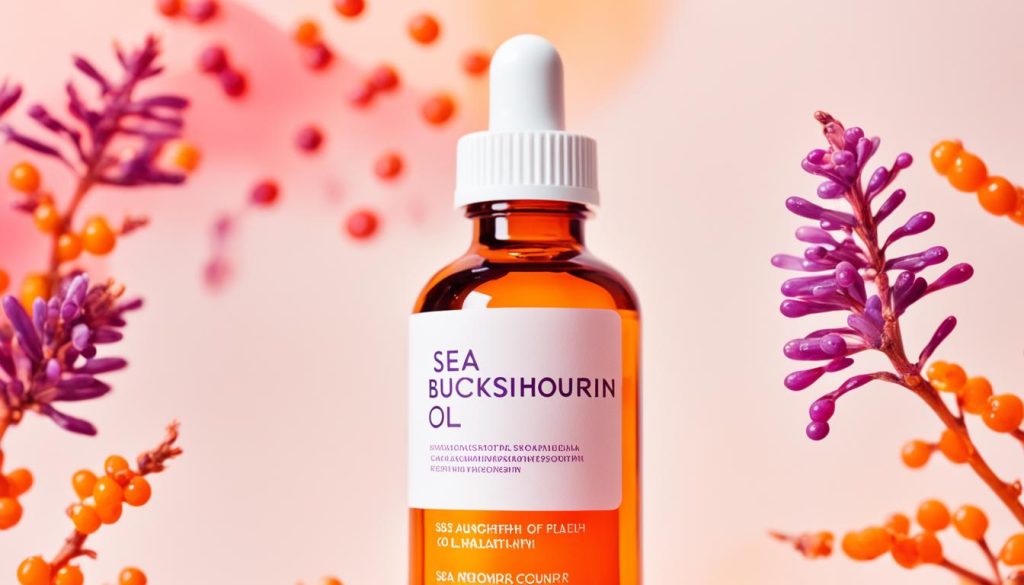Supporting your vaginal microbiome is just as important as supporting other areas of your health. Certain vitamins and supplements can play a vital role in maintaining vaginal health and preventing infections. In this article, we will explore the best vitamins for vaginal health and how they can benefit you.
Key Takeaways:
- Probiotics are essential for promoting vaginal health and restoring the balance of bacteria in the vagina.
- Vitamins like zinc, vitamin E, vitamin D, and vitamin C hold potential benefits for vaginal health.
- Fish oil and sea buckthorn oil may support healthy vaginal lubrication and mucosal health.
- The vaginal microbiome, primarily composed of Lactobacillus bacteria, plays a crucial role in maintaining vaginal health.
- Maintaining optimal vaginal pH levels is important for preventing bacterial imbalances and maintaining a healthy vaginal microbiome.
Now, let’s delve into each vitamin and supplement in more detail to understand their specific benefits for vaginal health.
The Power of Probiotics for Vaginal Health
When it comes to maintaining optimal vaginal health, probiotics can play a vital role. These live microorganisms help restore the balance of bacteria in the vagina, promoting a healthy vaginal microbiome. Multiple strains of probiotics have been found to be effective in supporting vaginal health.
One popular strain is Lactobacillus rhamnosus, which has been shown to inhibit the growth of harmful bacteria and prevent vaginal infections. Another beneficial strain is Lactobacillus acidophilus, which promotes vaginal pH balance and helps maintain a healthy vaginal environment.
To reap the benefits of probiotics for vaginal health, it is recommended to take a supplement that contains at least 8 to 20 million colony-forming units (CFU) of probiotic strains. This ensures an adequate dose of beneficial bacteria to support optimal vaginal health.
However, it’s important to note that probiotics may have potential side effects, especially when starting a new supplement. It is recommended to start with a small dose and gradually increase over time to allow your body to adjust. If you experience any negative reactions, consult with a healthcare professional.
Benefits of Probiotics for Vaginal Health
| Benefits | Strains |
|---|---|
| Promotes a healthy vaginal microbiome | Lactobacillus rhamnosus, Lactobacillus acidophilus |
| Inhibits the growth of harmful bacteria | Lactobacillus rhamnosus |
| Helps maintain vaginal pH balance | Lactobacillus acidophilus |
Adding probiotics to your daily routine can be a simple and effective way to support vaginal health. Consult with your healthcare provider to determine the best probiotic supplement for your needs and ensure it aligns with any existing health conditions or medications you may be taking.
“Probiotics are an excellent addition to your vaginal health regimen. They support a healthy vaginal microbiome, which is essential for preventing infections and maintaining overall vaginal wellness.” – Dr. Emily Johnson
The Benefits of Zinc for Vaginal Health
Vitamins are not the only supplements that play a role in maintaining vaginal health. Zinc, an essential mineral, can also contribute to the overall well-being of your intimate area. Zinc supplementation may support testosterone levels in postmenopausal women, which is beneficial for maintaining vaginal health. Testosterone, typically associated with male health, also plays a crucial role in promoting lubrication and supporting the integrity of vaginal tissue.
Your vaginal health relies on a delicate balance of hormones and nutrients, and zinc is an important component in this delicate ecosystem. By ensuring that your body has adequate zinc levels, you can support the maintenance of healthy vaginal tissue, promoting comfort and preventing dryness.
It’s worth noting that zinc is not a cure-all for vaginal health issues. However, when combined with other vitamins and supplements that support vaginal health, zinc can be an important part of an overall regimen aimed at maintaining and promoting the well-being of your intimate area.
Zinc-Rich Foods to Include in Your Diet
While supplementation is an option, you can also incorporate zinc-rich foods into your diet to naturally increase your intake of this essential mineral. Here are a few common foods that are excellent sources of zinc:
- Oysters
- Beef
- Poultry
- Pumpkin seeds
- Spinach
By including these foods in your diet, you can enhance your intake of zinc and potentially support your vaginal health.
| Food | Zinc Content (per 100g) |
|---|---|
| Oysters | 78.6mg |
| Beef | 6.7mg |
| Poultry | 2.8mg |
| Pumpkin seeds | 7.64mg |
| Spinach | 0.53mg |
These values may vary depending on the source and cooking methods, so it’s always best to consult nutritional labels or a registered dietitian for precise information.
As with any nutritional change or addition, it’s essential to consult with a healthcare professional before starting any new supplements or drastically altering your diet. They can provide personalized recommendations and guidance based on your unique needs and health status. Taking a holistic approach to vaginal health, including a balanced diet and appropriate supplementation, can contribute to maintaining optimal well-being.
Exploring the Role of Vitamin E in Vaginal Health
Vitamin E is a powerful antioxidant that plays a crucial role in supporting the immune system and combating oxidative stress. While it is commonly known for its benefits in skincare and overall health, vitamin E also holds potential benefits for vaginal health.
Some studies suggest that vaginal suppositories containing vitamin E can help support vaginal health by maintaining the integrity of vaginal tissue and promoting overall vaginal well-being. These suppositories deliver vitamin E directly to the vaginal area, providing targeted support where it is needed most.
Before considering the use of vaginal suppositories or any other supplements, it’s important to consult with a healthcare professional. They can provide personalized advice based on your specific needs and help you determine if vitamin E supplementation is appropriate for you.
The Importance of Vitamin D for Vaginal Health
Vitamin D plays a crucial role in maintaining optimal vaginal health. Not only does it support overall well-being, but it also plays a specific role in improving vaginal health during menopause.
During menopause, a decrease in estrogen levels can lead to several changes in the vaginal tissue, including thinning and dryness. This can result in discomfort, pain during intercourse, and an increased risk of vaginal infections. Vitamin D, however, has been shown to help alleviate these symptoms and improve vaginal health.
Furthermore, research has also found a connection between vitamin D levels and certain vaginal bacteria during pregnancy. Maintaining adequate vitamin D levels is important for a healthy vaginal microbiome, which is crucial for preventing infections and maintaining a balanced pH level.
There are several ways to ensure you’re getting enough vitamin D for your vaginal health. Sun exposure is a natural source of vitamin D, but it’s important to balance sun exposure with the risk of sun damage and skin cancer. You can also consider incorporating vitamin D-rich foods into your diet, such as fatty fish like salmon and mackerel, fortified dairy products, and egg yolks.
If obtaining sufficient vitamin D through sunlight and diet is challenging, supplements can be a convenient and effective way to meet your daily vitamin D needs. However, it’s important to consult with a healthcare professional before starting any new supplements to determine the appropriate dosage for your specific needs.
To summarize, vitamin D plays a vital role in maintaining vaginal health, particularly during menopause and pregnancy. Whether through sun exposure, dietary sources, or supplements, ensuring optimal vitamin D levels is essential for supporting a healthy vaginal microbiome and preventing vaginal infections.
Boosting Vaginal Health with Vitamin C
Vitamin C is a powerful ally in promoting vaginal health. With its antioxidant properties and ability to support a healthy immune system, vitamin C plays a vital role in maintaining overall well-being.
But what makes vitamin C particularly beneficial for vaginal health? Studies have shown that vaginal gels containing vitamin C can help lower vaginal pH levels. This is important because maintaining an acidic pH is crucial for a healthy vaginal microbiome.
By lowering vaginal pH, vitamin C creates an environment in which beneficial bacteria, like Lactobacillus, can thrive. These bacteria play a key role in preventing the growth of harmful bacteria and maintaining a balanced vaginal ecosystem.
Using vaginal gels or supplements that contain vitamin C can be an effective way to support vaginal health. However, it’s important to consult with a medical provider before introducing any new products or treatments.
Remember, each individual’s health needs may vary, and a healthcare professional can provide personalized guidance based on your unique circumstances.
| Food | Vitamin C Content (per 100g) |
|---|---|
| Oranges | 53.2mg |
| Strawberries | 58.8mg |
| Kiwi | 92.7mg |
| Red Bell Peppers | 128mg |
| Papaya | 60.9mg |
While incorporating vitamin C-rich foods into your diet can provide some benefits, vaginal gels or supplements are a more direct approach to supporting vaginal health. Remember to always prioritize your health and seek professional advice when considering new treatments.
Considering the Potential Benefits of Fish Oil for Vaginal Health
Fish oil, rich in omega-3 fatty acids, is touted as a potential supplement for promoting vaginal health. These essential fatty acids have been known to support various bodily functions, including the production of healthy vaginal lubrication and the maintenance of vaginal tissue health.
The omega-3 fatty acids found in fish oil have anti-inflammatory properties that can help reduce inflammation in the vaginal area, leading to improved vaginal comfort and reduced dryness. By promoting moisture production, fish oil may alleviate discomfort and enhance sexual well-being.
Additionally, fish oil may aid in preserving the integrity of vaginal tissue, contributing to vaginal health. Omega-3 fatty acids can help maintain the flexibility and elasticity of vaginal tissue, potentially reducing the risk of tears or irritation during sexual activity.
A study published in the Journal of Reproductive Medicine found that combining fish oil with vitamin D, particularly in individuals with vitamin D deficiency, may have a positive impact on estrogen production.
“Omega-3 fatty acids found in fish oil have been shown to increase plasma concentrations of estrogen, thus potentially improving vaginal health and lubrication,”
Although fish oil shows promise, it is essential to consult with a healthcare professional before incorporating it into your routine. They can provide personalized guidance on the appropriate dosage and potential interactions with other medications or supplements you may be taking.
Exploring the Potential of Sea Buckthorn Oil for Vaginal Health
When it comes to vaginal health, sea buckthorn oil is a natural supplement that holds promise. This oil is derived from the berries of the sea buckthorn plant, which is packed with health-promoting properties. Sea buckthorn oil contains vitamins, minerals, and antioxidants that can contribute to vaginal well-being.
One potential benefit of sea buckthorn oil for vaginal health is its ability to reduce vaginal dryness. Vaginal dryness can occur due to hormonal changes, menopause, or certain medications, and it can cause discomfort and pain during sexual intercourse. Sea buckthorn oil may help moisturize the vaginal area, increasing lubrication and reducing the discomfort associated with dryness.
Another potential advantage of sea buckthorn oil is its ability to support a healthy pH balance in the vagina. The vagina has an acidic pH that helps maintain a balanced vaginal microbiome and prevents the growth of harmful bacteria. Sea buckthorn oil may contribute to maintaining this acidic environment, promoting optimal vaginal health.
While sea buckthorn oil shows promise for vaginal health, it’s important to note that further research is needed to fully understand its specific effects and benefits. Consulting with a healthcare professional before starting any new supplements, including sea buckthorn oil, is recommended.
Potential Benefits of Sea Buckthorn Oil for Vaginal Health
| Benefit | Description |
|---|---|
| Reduced vaginal dryness | Sea buckthorn oil may help moisturize the vaginal area, reducing discomfort associated with dryness. |
| Supports healthy pH balance | Sea buckthorn oil may contribute to maintaining the acidic pH of the vagina, promoting a balanced vaginal microbiome. |
If you’re considering adding sea buckthorn oil to your vaginal health routine, be sure to speak with your healthcare provider to determine the appropriate dosage and to ensure it is safe for you to use. They can provide guidance on the best methods of application and any potential interactions with other medications or supplements you may be taking.

Understanding the Vaginal Microbiome and its Importance for Vaginal Health
The vaginal microbiome is a complex ecosystem consisting of bacteria, fungi, and other microorganisms that naturally inhabit the vagina. This delicate balance of microorganisms plays a crucial role in maintaining vaginal health and preventing infections. One of the most common types of bacteria found in the vaginal microbiome is Lactobacillus.
Lactobacillus bacteria are beneficial for vaginal health as they help maintain the vagina’s acidic pH level, which creates an inhospitable environment for harmful bacteria. These bacteria produce lactic acid, which helps to keep the vaginal pH in the optimal range of 3.8 to 4.5. By keeping the vaginal pH acidic, Lactobacillus bacteria inhibit the growth of potentially harmful microbes and maintain a healthy vaginal environment.
“The vaginal microbiome plays a crucial role in maintaining the vaginal health and preventing infections.”
When the balance of the vaginal microbiome is disrupted, it can lead to various health issues such as bacterial vaginosis, urinary tract infections, and yeast infections. Factors such as hormonal changes, sexual activity, antibiotics, and poor hygiene practices can disrupt the vaginal microbiome and increase the risk of these conditions.
Understanding the importance of the vaginal microbiome allows individuals to take proactive steps in maintaining vaginal health. By supporting the growth of beneficial bacteria like Lactobacillus, individuals can promote a healthy vaginal microbiome and reduce the risk of infections.
| Key Points: |
|---|
| A healthy vaginal microbiome is crucial for maintaining vaginal health and preventing infections. |
| Lactobacillus bacteria help maintain the acidic pH of the vagina, inhibiting the growth of harmful bacteria. |
| Disruptions to the vaginal microbiome can lead to various health issues, including bacterial vaginosis and yeast infections. |
| Supporting the growth of beneficial bacteria can help individuals maintain a healthy vaginal microbiome. |
Creating awareness about the vaginal microbiome and its importance in maintaining vaginal health is essential. By adopting healthy hygiene practices, avoiding excessive use of harsh soaps or douches, and maintaining a healthy lifestyle, individuals can support the growth of beneficial bacteria and promote optimal vaginal health.
How Lactobacillus Works to Regulate the Vaginal Microbiome
The vaginal microbiome plays a crucial role in maintaining vaginal health, and Lactobacillus bacteria are the key players in this delicate ecosystem. These beneficial bacteria work in several ways to regulate and protect the vaginal microbiome.
Firstly, Lactobacillus bacteria produce lactic acid, which helps to maintain an acidic pH in the vagina. This acidic environment is inhospitable to harmful bacteria, preventing their overgrowth and invasion. By producing lactic acid, Lactobacillus bacteria ensure that the vaginal environment remains balanced and healthy.
Additionally, Lactobacillus bacteria compete with other non-beneficial bacteria and yeast for space and resources in the vagina. They adhere to the vaginal walls, forming a protective barrier and preventing the attachment of harmful microbes. This competitive exclusion limits the growth and colonization of detrimental bacteria and yeast, further promoting vaginal health.
Moreover, Lactobacillus bacteria produce substances toxic to non-beneficial bacteria and yeast, further inhibiting their survival and proliferation. These substances act as natural antimicrobials, helping to keep the vaginal microbiome in a state of equilibrium.
Overall, Lactobacillus bacteria play a crucial role in maintaining the balance and health of the vaginal microbiome. Their production of lactic acid, competitive exclusion of harmful microbes, and production of antimicrobial substances help to regulate the vaginal environment and prevent infections.
“Lactobacillus bacteria are essential for maintaining a healthy vaginal microbiome. Their ability to produce lactic acid, compete with harmful microbes, and produce antimicrobial substances contributes to the overall balance and well-being of the vagina.”
| Lactobacillus and the Vaginal Microbiome | Role and Mechanisms |
|---|---|
| Production of Lactic Acid | Helps maintain an acidic pH in the vagina, inhibiting the growth of harmful bacteria. |
| Competitive Exclusion | Competes with non-beneficial bacteria and yeast, forming a protective barrier and limiting their growth. |
| Production of Antimicrobial Substances | Produces substances toxic to non-beneficial bacteria and yeast, further preventing their survival and proliferation. |
Understanding Vaginal pH Levels and their Impact on Vaginal Health
The ideal vaginal pH level for maintaining optimal vaginal health is between 3.8 and 4.5. An acidic environment helps maintain a healthy vaginal microbiome and prevents bacterial imbalances. Lactobacillus bacteria play a crucial role in maintaining the acidic pH of the vagina, contributing to overall vaginal health.
Keeping the vaginal pH within the appropriate range is important for several reasons. Firstly, an acidic pH creates an inhospitable environment for harmful bacteria, preventing them from flourishing and causing infections. Secondly, maintaining the acidic pH promotes the growth of beneficial bacteria, particularly Lactobacillus, which helps to maintain a balanced vaginal microbiome.
When the vaginal pH level becomes imbalanced and shifts towards alkalinity, it can disrupt the natural flora of the vagina, allowing harmful bacteria to multiply and potentially leading to conditions such as bacterial vaginosis or yeast infections.
Monitoring and maintaining optimal vaginal pH levels is essential for preserving vaginal health. Regular check-ups with a healthcare professional can help assess your vaginal pH levels and identify any changes or imbalances. Additionally, incorporating probiotics, such as those containing Lactobacillus strains, and avoiding harsh soaps or douching can help maintain a healthy vaginal pH and support overall vaginal health.

Vaginal pH levels play a critical role in determining the overall health of the vagina. Maintaining the acidic pH range of 3.8-4.5 helps to create an environment that supports the growth of beneficial bacteria and inhibits the proliferation of harmful bacteria. By understanding the importance of vaginal pH and taking proactive measures to maintain its balance, you can promote optimal vaginal health and reduce the risk of common vaginal infections.
Recognizing Symptoms of Vaginal pH Imbalance
Symptoms of vaginal pH imbalance can be indicators of underlying vaginal health issues. It is essential to pay attention to these symptoms as they can affect your overall well-being and quality of life. Here are some common signs and symptoms that may indicate a pH imbalance in the vagina:
- Itching: Persistent itching in the vaginal area can be a symptom of an imbalance in the pH levels.
- Pain and discomfort: Unexplained pain, discomfort, or a burning sensation in the vagina may be a result of pH imbalance.
- Changes in discharge: Abnormal changes in vaginal discharge, such as an increase in volume, changes in color or consistency, or an unpleasant odor, might indicate pH imbalance.
Hormonal fluctuations, such as changes in estrogen levels, can also influence vaginal pH levels and contribute to imbalances. Estrogen plays a crucial role in maintaining the vaginal environment by supporting the production of mucus and regulating pH levels.
The vaginal canal is lined with mucus-producing cells that help maintain the balance and pH of the vagina. When this delicate balance is disrupted, it can lead to an overgrowth of harmful bacteria or an environment that favors the growth of yeast, resulting in pH imbalances and associated symptoms.
It is important to remember that the presence of symptoms alone does not necessarily mean you have a pH imbalance. It is always recommended to consult a healthcare professional for an accurate diagnosis and appropriate treatment.
By recognizing the symptoms of vaginal pH imbalance, you can take proactive steps to address the issue and restore vaginal health. Seeking medical advice and maintaining a healthy diet, good hygiene practices, and appropriate vaginal care can help promote a balanced vaginal pH and overall vaginal well-being.
Symptoms of Vaginal pH Imbalance
| Symptoms | Description |
|---|---|
| Itching | Persistent itching in the vaginal area. |
| Pain and discomfort | Unexplained pain, discomfort, or burning sensation in the vagina. |
| Changes in discharge | Abnormal changes in vaginal discharge, such as increased volume, color or consistency changes, or unpleasant odor. |
If you experience any of these symptoms, it is important to seek advice from a healthcare professional for an accurate diagnosis and personalized treatment plan. They can help identify the underlying causes of the pH imbalance and provide suitable interventions to restore vaginal health.
The Importance of Monitoring and Maintaining Vaginal pH Levels
Monitoring and maintaining vaginal pH levels is crucial for supporting optimal vaginal health. The pH level of the vagina, which measures its acidity or alkalinity, plays a significant role in maintaining a healthy vaginal environment. When the vaginal pH balance is disrupted, it can lead to various vaginal health issues.
By monitoring your vaginal pH levels, you can keep track of any changes and take appropriate steps to maintain a balanced pH. At-home kits are available to measure vaginal pH levels easily and conveniently. These kits typically include pH test strips or swabs that you can use to assess your vaginal pH at any time.
Maintaining a healthy vaginal pH is essential for a balanced vaginal microbiome, which refers to the collection of bacteria and microorganisms that naturally reside in the vagina. A balanced microbiome helps protect against infections and promotes overall vaginal health.
To maintain a healthy vaginal pH, it’s important to support a balanced vaginal microbiome. One way to achieve this is by taking probiotics specifically formulated for vaginal health. Probiotics contain beneficial bacteria, such as Lactobacillus, which help maintain the natural acidity of the vagina and inhibit the growth of harmful bacteria.
Avoiding douching is also crucial for maintaining a healthy vaginal pH. Douching can disrupt the natural balance of bacteria in the vagina and increase the risk of infections and pH imbalances.
By monitoring and maintaining vaginal pH levels and supporting a balanced vaginal microbiome, you can promote optimal vaginal health and reduce the risk of vaginal infections.
Foods That Can Help Maintain a Healthy Vaginal pH
| Food | Potential Benefits |
|---|---|
| Yogurt | Contains probiotics that promote vaginal health |
| Cranberries | May help prevent urinary tract infections and support vaginal health |
| Greek yogurt | Rich in probiotics and protein, which can support vaginal health |
| Garlic | Has antimicrobial properties that may help prevent vaginal infections |
| Green leafy vegetables | Provide essential nutrients for overall vaginal health |
Eating a diet rich in these foods can help maintain a healthy vaginal pH and support overall vaginal health.
Conclusion
Maintaining vaginal health is essential for your overall well-being. By incorporating certain vitamins and supplements into your routine, you can support your vaginal health and prevent infections. Probiotics, such as Lactobacillus rhamnosus and Lactobacillus acidophilus, help restore the balance of bacteria in the vagina, while zinc supports testosterone levels, promoting lubrication and the integrity of vaginal tissue.
Furthermore, vitamins like E, D, and C, along with fish oil and sea buckthorn oil, offer potential benefits for vaginal health. Vitamin E’s antioxidant properties combat oxidative stress, while vitamin D plays a role in improving vaginal health during menopause. Vitamin C acts as an antioxidant and helps maintain a healthy vaginal microbiome. Fish oil and sea buckthorn oil support moisture production, tissue health, and pH balance in the vagina.
However, it’s crucial to consult with a healthcare professional before starting any new supplements or treatments, as individual needs may vary. By taking steps to support your vaginal microbiome and maintaining a healthy vaginal pH, you can promote optimal vaginal health and safeguard against infections. Prioritize your vaginal health for a happier, healthier you.



